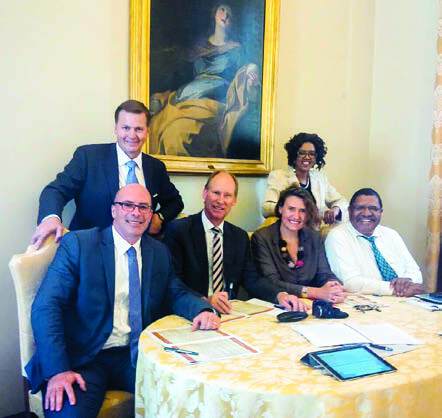On September 18 and 19, 2015, I was fortunate to be part of a small group of senior mining industry executives and non-governmental organization (NGO) representatives who travelled to the Vatican to meet with senior members of the Catholic Church, in what was known as a Day of Reflection. This followed a similar meeting that I attended in September 2013 and is in keeping with Pope Francis’s deliberate and, in my opinion, constructive efforts to engage with leaders of industry and civil society on the important issues of our time.
The gathering was convened by the Pontifical Council for Justice and Peace and led by His Eminence Cardinal Peter Turkson. The meetings provided an opportunity for a wide-ranging conversation about the role of mining globally as being fundamental to many sectors of human life and society, but also recognition that it is an industry with many challenges, given the pressing environmental, social and economic issues of our time. There was honest and direct input from communities that had been impacted negatively by mining, as well as a discussion of where mineral development had gone well and the key factors contributing to these more positive outcomes. Environmental issues, poverty, corruption, human rights, and prior and informed consent were all on the table for consideration. Given that in the room there were senior leaders of some of the largest mining companies in the world, including Anglo American, Rio Tinto, De Beers and Newmont, as well as church and NGO leaders who engage significantly on these issues globally, it was a significant opportunity for meaningful dialogue.
I should note that I am not a Catholic, and although I consider myself a Christian, the truth is that I, like so many, attend church only a few times a year, and I am not a fan of many of the rigid structures of organized religion. So, in agreeing to attend a meeting such as this, with the most senior leaders of an organization that counts 1.2 billion members and is some 2,000 years old, I really did not know what to expect. When we convened the discussion in the Pontifical Academy of Sciences, of which Galileo was once a member and of which many eminent scientists are members today, it was certainly intriguing to consider what might be possible.

Conflict between communities and resource companies over mining, energy and infrastructure projects is an issue that is both widespread and increasingly common. We, of course, have seen our share of this in British Columbia. Our land base being finite, as populations and our need for raw materials continue to increase, and concerns over the need for much greater levels of environmental stewardship and social justice continue to grow, there will be an even greater focus on and discussion about what is or is not appropriate development. That can be a scary conversation for many in the industry, who may fear that the outcome will be even further restrictions that make the business even more challenging than it already is. And it is a tough business!
Despite the challenges we face as an industry these days, I remain optimistic about the future and our collective ability to tackle these challenges. There are industry, community and indigenous leaders at the local, national and international levels who are trying very hard to do the right thing. Those stories deserve to be told as much as the negative ones we seem to hear about so often.
This gathering of industry and community leaders, NGOs and church representatives, convened by the Pontifical Council to address issues of a specific industry such as mining, is, I believe, unique in human history. We need what comes from the ground to support all aspects of modern society – that is without question. The key is to extract and transform those resources into the materials and products we need every day in a way that does not result in undue harm to the environment and that strengthens communities, respects human rights and distributes the benefits in a fair and equitable manner.
